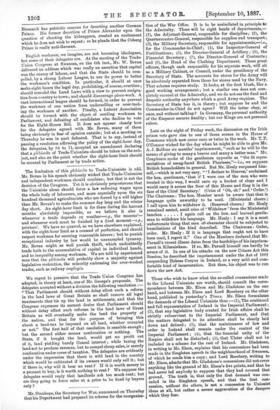Late on the night of Friday week, the discussion on
the Irish prison vote gave rise to one of those scenes in the House of Commons which now occur once or twice in the week. Mr. T. P. O'Connor wished for the day when he might be able to give Mr. A. J. Balfour six months' imprisonment, "such as he will be the means of giving to many a braver and many a better man." Mr. Conybeare spoke of the gentlemen opposite as "the fit repre- sentatives of smug-faced British Pharisees,"—i.e., we suppose British householders in general. But Mr. Healy surpassed him- self,—which is not very easy. " declare to Heaven,' exclaimed the hon. gentleman, that if I were one of the men who were treated in this way, I would save up a bucket of slops and I would carry it across the floor of this House and fling it in the face of the Chief Secretary.' (Cries of Oh, oh 1' and Order.') The Chairman The hon. Member most be aware that that is language quite unworthy to be used. (Ministerial cheers.) I call upon him to withdraw it. (Renewed cheers.) Mr. Healy remained seated, amid cries of Withdraw' from the Ministerial.
benches I again call on the hon. and learned gentle- man to withdraw his language. Mr. Healy : I say it is a most unfortunate thing that men of' character should be subjected to- humiliations of the kind described. The Chairman : Order,. order. Mr. Healy : If it is language that ought not to have been used, I regret it." One of the Members declared that Mr. Parnell's recent illness dates from the hardships of his imprison- ment in Kilmainham. If so, Mr. Parnell himself can hardly be aware of it. In one of his attacks on the new Crimes Act this Session, he described the imprisonment under the Act of 1881 suspending Habeas Corpus in Ireland, as a very mild and com- fortable kind of incarceration. But then, his object was to run down the new Act.


































 Previous page
Previous page